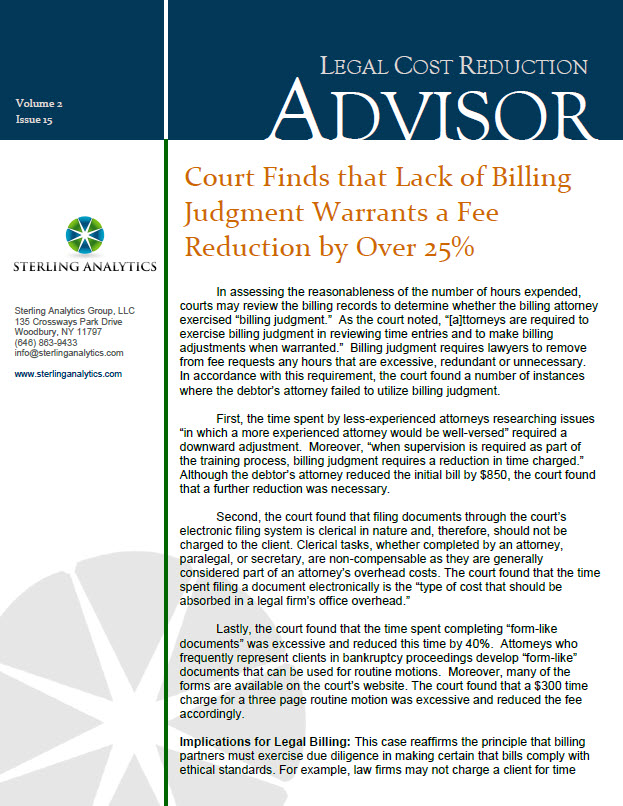In assessing the reasonableness of the number of hours expended, courts may review the billing records to determine whether the billing attorney exercised “billing judgment.” As the court noted, “[a]ttorneys are required to exercise billing judgment in reviewing time entries and to make billing adjustments when warranted.” Billing judgment requires lawyers to remove from fee requests any hours that are excessive, redundant or unnecessary. In accordance with this requirement, the court found a number of instances where the debtor’s attorney failed to utilize billing judgment.
First, the time spent by less-experienced attorneys researching issues “in which a more experienced attorney would be well-versed” required a downward adjustment. Moreover, “when supervision is required as part of the training process, billing judgment requires a reduction in time charged.” Although the debtor’s attorney reduced the initial bill by $850, the court found that a further reduction was necessary.
Second, the court found that filing documents through the court’s electronic filing system is clerical in nature and, therefore, should not be charged to the client. Clerical tasks, whether completed by an attorney, paralegal, or secretary, are non-compensable as they are generally considered part of an attorney’s overhead costs. The court found that the time spent filing a document electronically is the “type of cost that should be absorbed in a legal firm’s office overhead.”
Lastly, the court found that the time spent completing “form-like documents” was excessive and reduced this time by 40%. Attorneys who frequently represent clients in bankruptcy proceedings develop “form-like” documents that can be used for routine motions. Moreover, many of the forms are available on the court’s website. The court found that a $300 time charge for a three page routine motion was excessive and reduced the fee accordingly.
Implications for Legal Billing: This case reaffirms the principle that billing partners must exercise due diligence in making certain that bills comply with ethical standards. For example, law firms may not charge a client for time spent training new attorneys. This case brings out another aspect of this rule. Where tasks delegated to a new associate would have taken a fraction of the time if the task were completed by a more experienced attorney, a reduction is warranted. If a law firm wishes to delegate these types of tasks to new associates, it should not charge a client the entire amount of time expended. Rather, a law firm is required to exercise billing judgment in this situation and reduce the fee accordingly.
Also apparent from this decision is the idea that, although a law firm may reduce the initial fee, the fee may nonetheless be unreasonable and excessive. Just because a firm has reduced a number of time entries, does not mean that the bill should not be scrutinized. A careful review should be conducted to ensure that the bill complies with all ethical rules and guidelines.
Essentially, attorneys are required to review all bills before they are sent to the client. As noted by the court, “[n]ot every hour or part of an hour spent by an attorney is billable and it is incumbent on the attorney to exercise billing judgment.” This will require an attorney to make a number of adjustments to a client’s bill. As this court held, time that is excessive for the task performed, time spent performing clerical tasks, and time spent training new attorneys should be reduced or eliminated to reflect a reasonable fee.
* In re Weaver, 2011 WL 867136 (Bankr. D.N.M. 2011). Full copies of court decisions may be available through counsel or through various Internet links or paid services.
By Laura R. Bugdin


